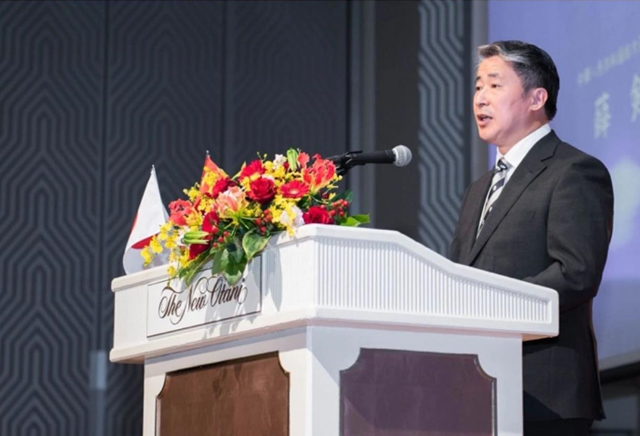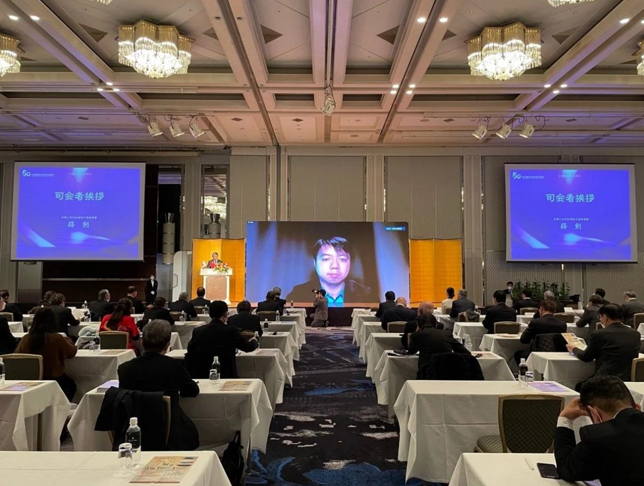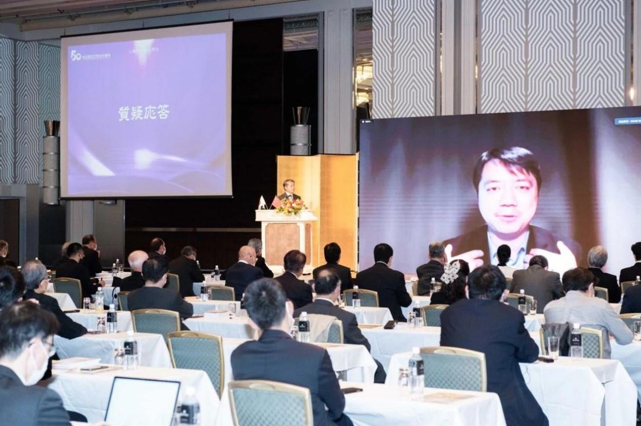LATEST INSIGHTS
Your Present Location: LATEST INSIGHTSConsulate-General of the People's Republic of China in Osaka held a lecture on "Understanding the New Era and Interpreting the 20th National Congress"
Consulate-General of the People's Republic of China in Osaka held a lecture on "Understanding the New Era and Interpreting the 20th National Congress"
On December 5, 2022, Consulate-General of the People's Republic of China in Osaka held a lecture on "Understanding the New Era and Interpreting the 20th National Congress of the Communist Party of China", inviting Wang Wen, Executive dean of Chongyang Institute for Finance Studies at Renmin University of China (RDCY), to give a lecture on Chinese path to modernization in order to help Japanese people understand the spirit of the 20th National Congress of the Communist Party of China more objectively and accurately. Consul General of P.R.China in Osaka Xue Jian hosted the lecture, which was attended by about 150 representatives from local government departments, economic circles, overseas Chinese groups, Chinese institutions and media in Western Japan.

Focusing on "Chinese path to modernization", Wang introduced its history and connotation, and gave an in-depth and easy-to-understand explanation of the main contents of the 20th CPC National Congress. The main keyword of the 20th CPC National Congress is Chinese modernization, said Wang. The history of the new China is the history of the CPC uniting and leading the people to build the country, the history of the CPC working for the revival of the nation and the happiness of the people, also the history of the Chinese Communists' relentless exploration and pursuit of Chinese modernization. After a long period of practice, the Chinese Communists, on the basis of the Four Modernizations of the fields of agriculture, industry, defense, and science and technology, have in recent years proposed to promote the modernization of the national governance system and the ability to govern, further enriching the connotation of Chinese modernization. The report of 20th CPC National Congress proposed that from now on, the central task of the CPC will be to lead the Chinese people of all ethnic groups in a concerted effort to realize the Second Centenary Goal of building China into a great modern socialist country in all respects and to advance the rejuvenation of the Chinese nation on all fronts through a Chinese path to modernization. This is a major assertion that will guide and regulate China's future development.
Wang made specific interpretations on each of the five characteristics of Chinese modernization, namely, modernization of a huge population, modernization of common prosperity for all, modernization of material and cultural-ethical advancement, modernization of harmony between humanity and nature, and modernization of peaceful development. It has Chinese characteristics based on its own national conditions. The Chinese modernization practice not only puts an end to the fallacy of the "End of History" in the West, but also offers the possibility to overcome the global modernization crisis, provides new options for countries to modernize, and will develop a new form of human advancement.

In particular, Wang also looked at the future of Chinese-style modernization from six latitudes in the light of the contrast between China and the United States, emphasizing that time is on China's side and China's strategic opportunities remain in the competition for modernization among major powers. Wang emphasized that China has a very high rate of implementation on its policies, and that a high degree of alignment between national development goals and progress in practice can be seen in the Five-year plans, the Party Congress Reports, and the annual Government Work Reports. China's policies are planned and long-term, for example, sacrificing some economic growth to protect the ecological environment. The United States, on the other hand, is full of repetitive and short-sighted policies, reversing all the policies of its predecessors when the president changes, with little regard for long-term effects. Therefore, in terms of policy, "China has been standing for a long time, but the United States will not be far away".
The Chinese believe in the value of "happiness is gained through struggle" and believe that as long as they work hard, their lives will always get better. With the collective rise of emerging countries and the political awakening of developing countries, the international order has inevitably become fairer and more just. In contrast, the "class consolidation" phenomenon in the U.S. has become increasingly serious in the past 20 years. In the future, the U.S. will not be able to return to the road of colonialism, foreign wars are not cost-effective, and the days of "robbery" by the unfair international financial and trade intellectual property rights system will come to an end, and the U.S. hegemony will definitely come to an end. Therefore, in terms of development, "China can afford to fight, but the United States cannot grab".
In the past 40 years, China has not only not waged any foreign wars or been invaded, but also has had no large-scale riots, no famine, no financial or economic crisis, and has always been at the forefront of the best security in the world. Long-term stability has allowed China to continue to be an engine of growth for the world economy, rapid urbanization and continued growth in investment and trade have made it possible for the Chinese economy to maintain a 4-5% growth development over the next 10-20 years. In contrast, racial conflict, political polarization, and the division between rich and poor have become serious social problems that are difficult to solve, the theory such as "American Civil War", "Two Americas" and even "American Collapse" are becoming more and more prevalent. Worse still, the so-called "democratic empowerment" has "overloaded" the rights of individuals in the U.S., and social instability and political disorder are depleting the development expectations of the United States. Therefore, in terms of society, "China is stable, but the United States is not stopping".
China continues to strengthen its national strategic science and technology forces, and the U.S.-China science and technology competition has entered a white-hot stage. The U.S. is still ahead of China in high-tech fields in general, and many are still stuck in China's neck. However, over the past 20 years, China's investment in scientific research has increased much more than that of the U.S. and is expected to surpass the U.S. around 2023-2025. From household appliances to aerospace technology, from large aircraft to 5G, from chips to industrial software, it has been proven that science and technology cannot be monopolized in the long run. The intensification of external blockade and the release of China's huge market demand will force and drive China to innovate faster and better. Therefore: in terms of technology, "China can make it, the United States cannot cover it".
The U.S.-China trade war and technology war show that China can afford to fight and has not lost. If the U.S. forces China to fight a war of national revival in the next few years, the Chinese will be able to afford it. The Chinese military will not take the initiative to go to war, but it is not afraid to fight either. The U.S. military's record in Korea, Vietnam, Afghanistan, Iraq, the Syrian War, and now the Ukraine crisis, shows that its "paper tiger" character is increasingly evident. Therefore, in terms of wars, "China can afford to fight, but the United States cannot win".
Many problems have arisen in the course of China's development, but they are all reformable and have been well addressed and solved through development. China's development itself is a cycle of "problems - reform - development - new problems – new reform - new development". A cyclical historical process. This is an important reason why the Chinese people generally have optimistic expectations for the future and maintain a long-term desire for a better life. In contrast, the U.S. has many seemingly insoluble problems, including the lack of universal health care, racial discrimination, the proliferation of guns, the polarization between rich and poor, immigration policy, the military-industrial complex, and even abortion. Not only are these problems "unreformable", but some are even getting worse. Thus, in terms of problems, "China can change, but the United States cannot change".

Based on a profound analysis of the historical evolution of Chinese-style modernization and future expectations, Wang put forward three hopes and suggestions of his own to Japan. First, he hopes that Japan will believe in Chinese peace and not be led by the so-called "China threat theory"; second, he hopes that Japan will believe in Chinese opportunities, refuse to lie flat, and continue to actively strive for first in cooperation with China; third, he hopes that Japan will believe in Chinese tolerance, refuse to be closed and decoupled, and embrace the whole world with China. Wang stressed that China and Japan should overcome the adverse effects and further increase cooperation in a wide range of fields, contributing more positive energy to the peaceful development of two countries, as well as to Asia and the world.
During the question-and-answer session, Wang interacted with the participants on such hot topics as epidemic prevention and control, real estate industry development, and the World Cup, which have attracted much attention recently.Wang emphasized that China's Covid-19 Pandemic prevention and control policy is scientific, correct and effective. In the past three years since the outbreak, the Chinese government has always insisted on putting people's lives and health in the first place, optimizing and improving prevention and control measures according to the situation and achieving significant positive results in the prevention and control of the Covid-19 and economic and social development. China will continue to adhere to scientific and precise measures, with good prevention and control results to protect the continued healthy and stable development of the economy and society, and continue to contribute to the world economic recovery. Regarding the economic situation, Wang Wen said that the impact of the Covid-19 has slowed down investment in various industries, including real estate, and to solve the problems faced by economic growth, China will promote consumption as the main driver to recover the economy and use consumption-driven growth to help achieve the goal of green development.
Consul General Xue Jian spoke highly of Prof. Wang Wen's in-depth interpretation of the 20th CPC National Congress in his concluding remarks, saying that the great significance and far-reaching influence of the 20th CPC National Congress is not only for China itself, but also a great benefit for the peaceful development of the world. It is hoped that Japanese community will not be misled by the hype and exaggeration of some media and miss the historical opportunity in the face of China's rapid development, but will perceive the new era China with a positive and open mind, form an objective, balanced and friendly "China view", further strengthen practical exchanges and mutually beneficial cooperation between China and Japan, better boost their own development, and work with China to build China-Japan relations that meet the requirements of the new era.

The lecture lasted for more than 2 hours and the participants were fully engaged. After the meeting, everyone said that the lecture was very timely, and it was a rare opportunity to hear a comprehensive, in-depth and systematic interpretation of the 20th National Congress of the Communist Party of China by authoritative Chinese experts, especially when they heard many views different from those reported by the Japanese media, which was very touching and inspiring. Through this lecture, everyone gained a deeper and more accurate understanding and grasp of the spirit of the 20th CPC National Congress, especially the Chinese path to modernization, and strengthened the belief and confidence in further deepening Sino-Japanese cooperation.























































































 京公网安备 11010802037854号
京公网安备 11010802037854号





